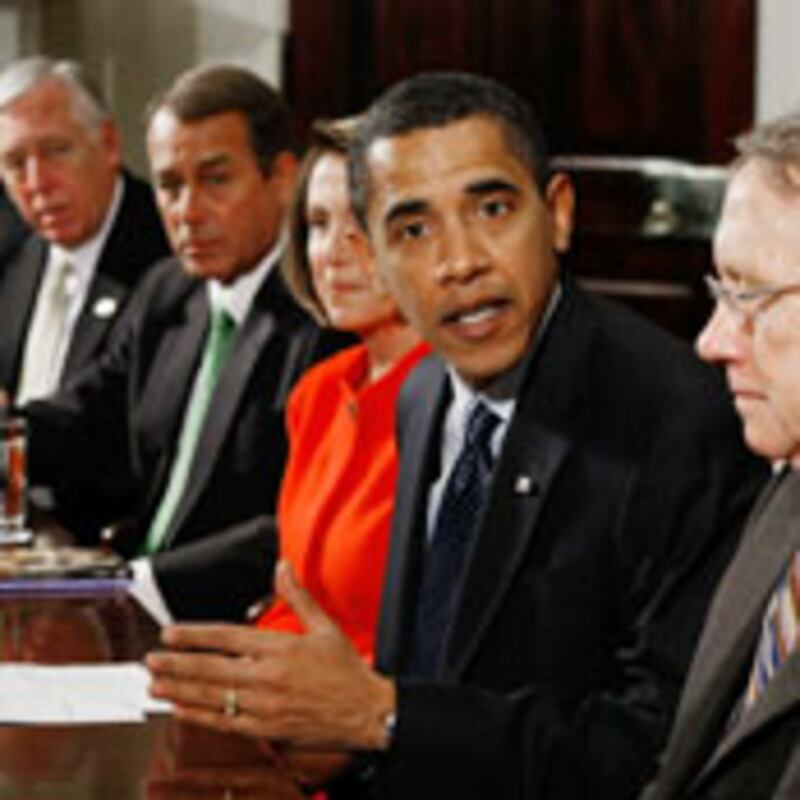
This week marks the first major test of Barack Obama’s presidency. While he insists his bill will jump start the economy, Republicans are desperately searching for a reason to oppose it. John Avlon rates the winners and loser so far. Avlon is the author of Wingnuts: How the Lunatic Fringe Is Hijacking America.
Politics is perception, and less than one week after inauguration, the battle lines are being drawn on President Obama's unprecedented and administration-defining $825 billion stimulus bill.
The White House is furiously trying to define the terms of debate, with the President's weekly address and Democratic bigwigs hitting the Sunday morning talk show circuit. The message: this is an urgently-needed and balanced plan of job-creating stimulus spending, tax cuts, and infrastructure investment that can lead to a clean-energy economy.
Expect Republicans to wage an attack by anecdote on the stimulus package, cherry-picking absurdities and broadcasting them far and wide.
Republicans are busy trying to craft a coherent rationale for resistance, hammering home at what they see as larded-up overspending, limited tax cuts, and lagging job-creation—adding up to what one former Republican Study Committee staffer characterized as "the mother of all Christmas tree spending bills."
This week will be the showdown. Treasury Secretary-nominee Tim Geithner comes up for a confirmation vote Monday, President Obama visits Capitol Hill on Tuesday as the Senate begins deliberation, while the House takes up the stimulus bill Wednesday.
The bridge-builder-in-chief set the bar high when he said he wanted 80 Senate votes for the stimulus bill—a bipartisan mandate to usher in a post-partisan era. Now that the actual cat-herding process has begun, that benchmark has been backed off. "When you start making choices, you start losing friends," warned Democrat budget hawk Sen. Kent Conrad. A self-imposed Presidents' Day weekend signing goal still looms while the economic crisis escalates.
The devil, of course, is in the details—and in the current $825 billion package (it is likely to go higher if the AMT patch is added, as expected) there are plenty of details.
Obama has learned from the mistakes of the Bush-era $700 billion TARP bailout black-box, insisting on increased transparency and accountability, to be publicly monitored at www.recovery.gov. He's also learned from the Clinton-era health-care fiasco to take an open-ended approach to the bill's precise contents, beyond the ban on earmarks.

The devilish downside is that Congress' input invites broad categories ($13 billion for disadvantaged children) and specific non sequiturs ($200 million for new grass on the National Mall, and $360 million to fight sexually transmitted diseases, including funds for contraception) that have no evident link to economic stimulus.
Expect Republicans to wage an attack by anecdote on the stimulus package, cherry-picking absurdities and broadcasting them far and wide. A more rational line of argument asks why worthy programs like Pell Grants or Head Start funding have found their way into this job-creation legislation. But stimulus skeptics received their most powerful boost from the Congressional Budget Office, which released a report questioning how much of the infrastructure spending would actually impact the economy in the coming year. All this led to one-man good-cop/bad-cop John McCain to declare, "I think there has to be major rewrites if we want to stimulate the economy…As it stands now, I would not support it."
Republicans reflexively want to present themselves as the taxpayers' defender, but they are still mired in an existential crisis after the profligate spending of the Bush years. Obama is inheriting a $1.2 trillion dollar deficit, largely Republican-made, even as he looks to almost double it. The GOP's lost moral authority on issues of fiscal responsibility limits current debate by a lack of credible counterpoint. We have become temporarily numb to the cost of this Keynesian comeback.
After all, it was Dick Cheney who famously told Treasury Secretary Paul O'Neill that "deficits don't matter." Now that we're deep in a bipartisan tax-cut-and-spend smorgasbord, Republican attempts to negotiate the focus of Obama's $330 billion in proposed tax cuts are likely to have limited leverage—even as liberal economists like Paul Krugman question their inclusion in the stimulus bill at all.
With a 68 percent approval rating, President Obama has plenty of political capital to spend at the moment. His symbolic success must now translate to substance.
Consistent with Chief of Staff Emanuel's admonition to "never let a serious crisis go to waste," the administration is piling as much of its overall agenda into the bill as possible. But perhaps the biggest promise Obama made in the campaign is to break through the hyper-partisan divides that define politics-as-usual in Washington DC. To do this, he'll need to engage in something more than photo-op bipartisanship. And if you listen carefully to Republicans, you can hear poll-driven traces of common ground.
Earlier this month, young GOP leader Paul Ryan wrote in the Wall Street Journal, "At the moment, the public is not thinking in terms of 'big government' or 'small government.' Instead, Americans want efficient government." In his inaugural address a week later, President Obama echoed this idea, saying, "The question we ask today is not whether our government is too big or too small, but whether it works." The challenge of the coming months will be to move beyond rhetorical overlap toward something real.
Republicans must know that they have got to be something more than The Party of No. Democrats should resist the temptation to pass the stimulus bill along party lines alone. It's significant that President Obama wants a broader victory to signify a break with the 51 percent means-a-mandate, play-to-the-base politics of the past. He understands that's the change voters are looking for. And facing a potentially combustible combination of high expectations and a down economy, he knows the old adage that you never get a second chance to make a first impression.
John P. Avlon is the author of Independent Nation: How Centrists Can Change American Politics. Avlon also served as Director of Speechwriting and Deputy Director of Policy for Rudy Giuliani's Presidential Campaign. Previously, he was a columnist for the New York Sun and served as Chief Speechwriter and Deputy Communications Director for Mayor Rudolph Giuliani. He worked on Bill Clinton's 1996 presidential campaign.






